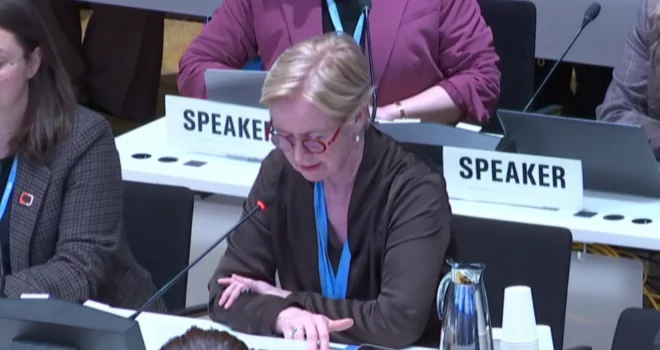
The coalition, led by PATH, brings together multisectoral partners to reduce the toll of noncommunicable diseases, including diabetes, hypertension, and cardiovascular disease.
New York, September 18, 2017—A multisectoral partnership today launched a first-of-its-kind global coalition dedicated to increasing access to essential medicines and health products to prevent and treat noncommunicable diseases (NCDs) and conditions, including diabetes, hypertension, and cardiovascular disease.
The new Coalition for Access to NCD Medicines & Products brings together governments, the private sector, philanthropic and academic institutions, and nongovernmental organizations to tackle barriers countries face in procuring, supplying, and distributing essential medicines and technologies and ensuring they are used effectively. PATH will serve as the coalition secretariat.
The coalition will partner with countries to help them achieve the World Health Organization target of 80 percent availability of affordable technologies and essential medicines, including generics, required to treat NCDs in both public and private facilities.
The launch event, alongside the United Nations General Assembly in New York, features an interactive panel of global health leaders and influencers from across sectors sharing their perspectives on the opportunities ahead to reduce the toll of NCDs.
Panel speakers include Peter Singer, CEO of Grand Challenges Canada; Sir George Alleyne, director emeritus, Pan American Health Organization; Khawar Mann, partner with the Abraaj Group; Rebecca Martin, director of the Center for Global Health at the US Centers for Disease Control and Prevention; Jean Claude Mbanya, professor of medicine and endocrinology at the University of Yaoundé in Cameroon; and Sania Nishtar, founder and president of Heartfile.
“Medicines and technologies for chronic diseases are less available and less affordable for people in low-resource countries,” said Steve Davis, PATH president and CEO. “That equity gap leaves the most vulnerable people at greater risk for complications and death from NCDs. We can close the gap by ensuring that innovative new tools and existing technologies are within reach for people who need them, regardless of where they live.”
NCDs are the number one cause of death and disability worldwide. About three-quarters of NCD-related deaths occur in low- and middle-income countries, and it is estimated that 100 million people in low-resource settings are forced into poverty each year by the costs associated with managing chronic diseases.
The coalition is unique in several ways, from its multisectoral approach of engaging stakeholders across sectors at all levels to its focus on increasing access to medicines and products and providing technical and advocacy expertise both at the country and global levels.
“We know from our work with health facilities, pharmacies, care providers, and patients that many people with diabetes and cardiovascular disease are not able to access the medicines and products they need at a price they can afford,” said Dr. Kibachio Joseph, head, noncommunicable disease unit, Ministry of Health, Republic of Kenya. “This coalition will add great momentum to the government of Kenya’s ongoing efforts to ensure that people can access the treatment they need.”
Progress on reducing the burden of NCDs has been slow and uneven within and across countries. Some of the issues affecting access to medicines and products include inefficient procurement practices, inadequate funding models, and pricing mark-ups along the supply chain.
Coalition members will focus specifically on strengthening health systems and the supply chain for essential medicines and products, financing and costing issues, and advocacy.
“By leveraging the skills, resources, and expertise of members, the coalition will complement existing initiatives, create new opportunities, and raise awareness about the importance of ensuring equal access to health commodities for NCDs,” said Helen McGuire, leader of PATH’s NCD program. “Together, we can identify and address barriers to access, strengthen supply chains, control the risk of interruptions or delays, and efficiently get products to market.”
The work builds on efforts by PATH and other founding members that have been laying the groundwork for the coalition for several years. Health coalitions on reproductive health, tuberculosis, and HIV/AIDS have successfully used a similar approach to strengthen supply chains and reduce financial burdens on individual and national budgets.
The coalition includes the following member organizations:
- Ministry of Health, Republic of Kenya
- Ministry of Health & Social Action, Republic of Senegal
- Ministry of Health, Republic of Uganda
- NCD Alliance
- Novo Nordisk
- PATH (secretariat)
- Pfizer, Inc.
- RTI International
- World Heart Federation
- NCD Child
- International Pediatric Association
- World Hypertension League
- International Federation of Pharmaceutical Manufacturers & Associations
- Teva Pharmaceutical Industries Ltd.
- Merck KGaA, Darmstadt, Germany
Key funders of the coalition include Novo Nordisk, PATH, and Pfizer, Inc.
(Source: PATH website)
About PATH
PATH is the leader in global health innovation. An international nonprofit organization, PATH saves lives and improves health, especially among women and children. PATH accelerates innovation across five platforms—vaccines, drugs, diagnostics, devices, and system and service innovations—that harness our entrepreneurial insight, scientific and public health expertise, and passion for health equity. By mobilizing partners around the world, PATH takes innovation to scale, working alongside countries primarily in Africa and Asia to tackle their greatest health needs. With these key partners, PATH delivers measurable results that disrupt the cycle of poor health. Learn more at www.path.org.
More reading: PAHO/WHO calls for grant applications to support health policy, programs and systems on projects related to the SDGS


